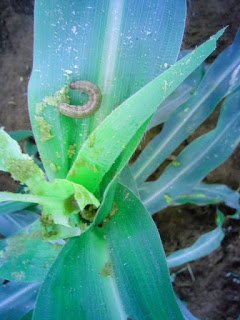Armyworm on a maize crop
Moses Ziyambi
ZVISHAVANE – Farmers have been warned of the dangers posed to their crops by the fall armyworm, a severely destructive pest that is spread by migratory moths in the rainy season.
Government, through the Plant Protection Research Institute (PPRI), has recently been distributing chemicals to try to contain the fall worm, a foreign strain within the armyworm family, which threatens to destroy thousands of hectarage of crops.
Local agronomist, Clement Chimuti said it was time for farmers to take preventative measures so as to ensure that they do not suffer huge losses to the fall army worm menace.
“There are many chemicals that can help farmers to protect their crops from the fall worm. It is advisable that farmers use the requisite pesticides when their maize crop is just a few weeks old and when they reach knee-level so that when the moths come, they lay their eggs on top of the pesticides,” said Chimuti.
He advised farmers to make use of such chemicals as Kombat, Carbaryl 85 and Fenvalerate.
“Kombat is particularly recommended for application to crops that are at their knee-level stage of growth. It’s also an effective pesticide against the maize stalkborer while Fenvalerate is also effective against such worms as the spiny bollworm in cotton.
“It is however, better to use preventative pesticides than to try to control the pest when the plant is already affected,” said Chimuti.
The Commercial Farmers Union (CFU) says the fall armyworm has been persistent mostly on irrigated maize crop as it approaches tasselling stage.
In Raffingora, CFU says, fall armyworm is widespread on irrigated and rain-fed maize crop at different levels of growth.
In its larval stage, the pest is comparable to the locust for its devastating impact on crops. It also breeds rapidly and is difficult to detect.
The fall armyworm has also hit Zvishavane, Shurugwi, Gokwe South, Gweru, Kwekwe districts of Midlands, according to PPRI.agriculture

